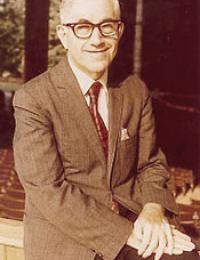The streets were home to him, one long carouse
In sun and common things. To leave the house
That shut him in and roam familiar streets,
Whose houses shut him out, shut out defeats
Of narrow walls and lonely rooms and brought
New glories of small battles daily fought
With his environment; it gave ingress
Into these people's lives; possessionless
And homeless though he felt, the poor defense
Of houses fell before his conquering sense
Of proud possession ; with the sky and air
Their lives and property were his to share.
Each day the streets were spun from him afresh,
A web for spidery wonder to enmesh
With shining subtlety new evidence
Of people's likeness and their difference.
What his own life was like he knew; it flattered
His vanity to know the same things mattered
To others, and it teased him that these walls
Held doors and windows opening on halls
Of self which he might glimpse but never know,
Barriers that he could never overthrow.
He steeped his senses in the look, the smell,
The sound of houses; in bright roofs that fell
In shadows on the lawn; in walls and glass
That caught the sun ; in color, line, and mass
Of shingles, gravel, brick, paint, grass, and smoke;
Snatches of phonographs, pianos; folk
In casual encounters at their doors;
Genie-like tradesmen, women doing chores,
Old men on sticks who hugged the sunny side,
Children on swings and carts and skates who cried
A tuneless song; dogs running out to sniff
Or bark at him; the titillating whiff
Of cooking meals and burning trash; a line
Of blowing clothes in which he could divine
An augury as in the flight of birds;
Milk-jars on steps - stray fragments, hints, mute words,
A jig-saw puzzle, scattered, disconnected –
He pieced together bits that he collected.
Watching the town grow as one builds his house,
He was the rentless tenant, like a mouse
That slips in from the winter fields to gnaw
Through walls and nibble crumbs while men plied saw
And hammer (sounds that thrilled him) to push back
The prairie. He would cross the railroad track
And leave behind the park and power plant,
The smell of gins, the engines' throb and pant,
Exchange the pavement for dirt roads and tang
Of fields and cows, where winds and high wires sang,
To watch the changing and receding line
Dividing town from prairie. The blue wine
Of wind and distance bubbled in his brain.
He liked to feel himself a moment strain
At his safe leash before the thoroughfares
Absorbed him to repattern plotted squares.
